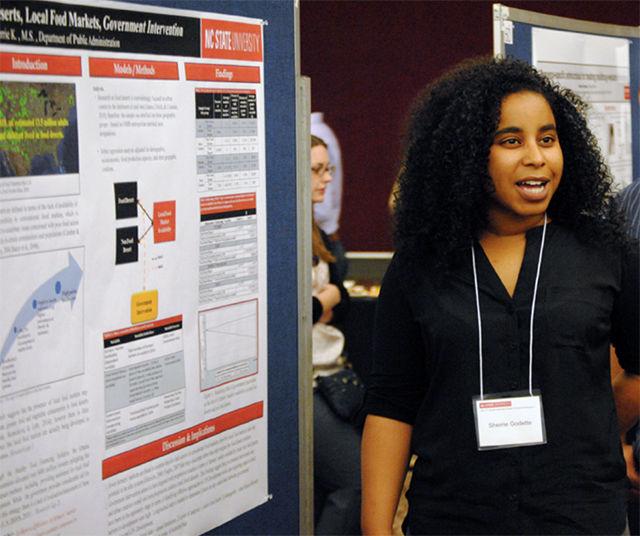 Sherrie Godette presents her research on food deserts during a symposium. Godette’s research focused on food insecurities and depletion of farms." />
Sherrie Godette presents her research on food deserts during a symposium. Godette’s research focused on food insecurities and depletion of farms." />
Contributed by Sherrie Godette
Sherrie Godette presents her research on food deserts during a symposium. Godette’s research focused on food insecurities and depletion of farms.
NC State alumna Sherrie Godette has always had an interest in agriculture. Specifically, she works with food deserts and serves as an advocate for small and mid-scale farmers around North Carolina. Godette is from Havelock, North Carolina, coming from a family rich in agricultural history.
Godette defines a food desert as “areas with limited accessibility and availability to all types of food stores, both conventional and local markets.”*
According to data from the U.S. Department of Agriculture Food Environment Atlas, about 3 percent of all North Carolina counties were food deserts in 2010. This means that 33 percent of all residents lived at least a mile away from supermarkets in urban counties and 10 miles away in rural counties.
Using data collected from the USDA Environmental Atlas, Godette estimated that 68 percent of the counties considered food deserts are rural.* Therefore, rural counties are three to 12 times more likely to be food deserts compared to suburban and urban counties.
“My grandfather’s family-owned farms and used to produce goods to sell in the market, however the generations after did not continue the trade,” Godette said. “The more I learned about the complexities and politics that drive the agriculture system, the more I started to understand why my family did not continue our agricultural legacy.”
Due to the many difficulties that arise from running a farm, Godette became interested in figuring out ways to alleviate the issues that impede the success of countless small, family farms.
While working for the USDA, Godette earned her bachelor’s and master’s degrees at North Carolina Agricultural and Technical State University in applied economics. Afterward, she earned her doctorate at NC State in public administration.
“My interest in agriculture grew even more when I began working with the U.S. Department of Agriculture in my senior year of high school,” Godette said. “I earned a full scholarship through the USDA 1890 National Scholars Program.”
Having the scholarship gave Godette the opportunity to work with the USDA while simultaneously earning her bachelor’s and master’s degrees. She worked for the agricultural department for 10 years.
Godette’s applied economics degrees were concentrated in the field of agriculture, but she became familiar with the concept of food deserts as she commenced her doctorate research.
While earning her doctorate, Godette had the opportunity to work on several projects that focused on examining facilitators and barriers to local food development in issues such as food insecurity, the depletion of farms and the loss of buffer zones to military installations.
“This is when I became familiar with the food desert problem and began my dissertation on quantitative research that examined whether local food system development is a reasonable solution towards mitigating the existence of food deserts,” Godette said.
Although her research ended, she still works with many of the farmers to this day. Godette’s dedication to agricultural improvement is present in her educational achievements and her continued involvement with farmer advocacy.
According to Godette, small and midscale farmers have to develop alternative strategies like specialty products, organic crops, special greenhouses and education initiatives.
“I loved actually being engaged with the farmers,” Godette said. “It makes me feel really good that I am using the education that I have gained to help others who may have not had the same opportunities and access.”
*Corrections, Sept. 24, 2016: This post originally misstated how Godette defines food deserts. It also falsely claimed that the USDA made an estimate of rural areas that are food deserts; Godette made this estimation.